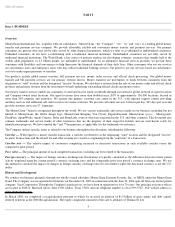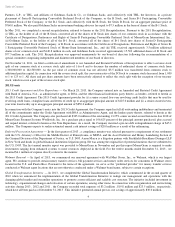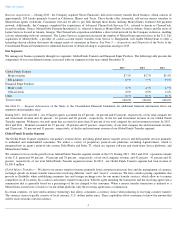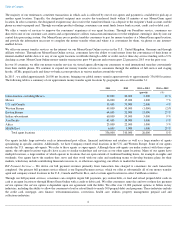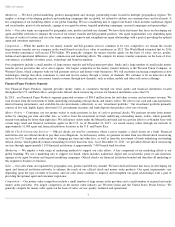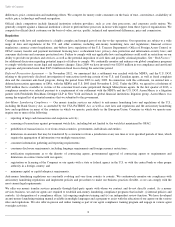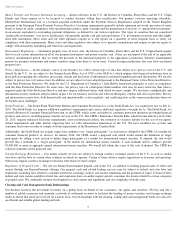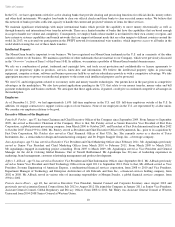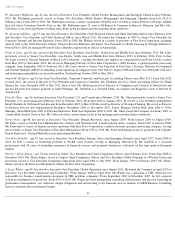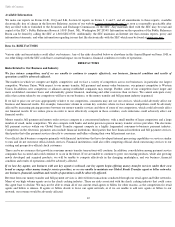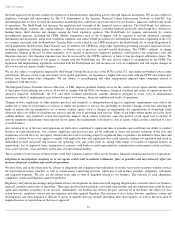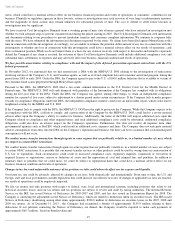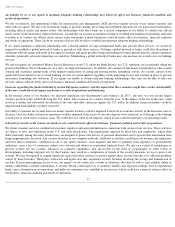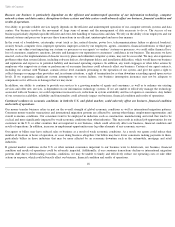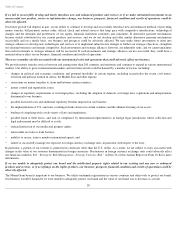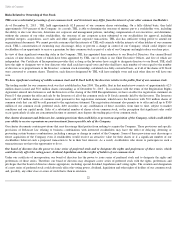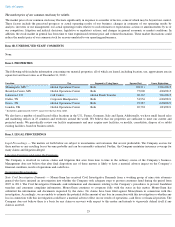MoneyGram 2013 Annual Report Download - page 15
Download and view the complete annual report
Please find page 15 of the 2013 MoneyGram annual report below. You can navigate through the pages in the report by either clicking on the pages listed below, or by using the keyword search tool below to find specific information within the annual report.
Table of Contents
Larger agents and billers in our Global Funds Transfer segment are increasingly demanding financial concessions and more information
technology customization. The development, equipment and capital necessary to meet these demands could require substantial expenditures and
there can be no assurance that we will have the available capital after servicing our debt, or that we will be allowed to make such expenditures
under the terms of our credit agreement. If we are unable to meet these demands, we could lose customers and our business, financial condition
and results of operations could be adversely affected.
A substantial portion of our transaction volume is generated by a limited number of key agents. During 2013 , 2012 and 2011
, our 10 largest
agents accounted for 43 percent , 44 percent and 45 percent , respectively, of our total company fee and investment revenue and 44 percent ,
46
percent and 48 percent , respectively, of the fee and investment revenue of our Global Funds Transfer segment. During 2013 , 2012 and 2011
,
our largest agent, Walmart, accounted for 27 percent , 28 percent and 29 percent
, respectively, of our total company fee and investment revenue,
and 28 percent , 30 percent and 31 percent
, respectively, of the fee and investment revenue of our Global Funds Transfer segment. If our
contracts with Walmart or any of our other key agents are not renewed or are terminated, or if such agents reduce the number of their locations
or the volume of their business with us, or cease doing business, we might not be able to replace the volume of business conducted through these
agents, and our business, financial condition and results of operations could be adversely affected. In addition, if any of our key agents begin
offering money transfer services under their own brand name, such as a possible Walmart branded product, or if they engage other money
transfer service providers, either of which that may be permissible under our contract, our business, financial condition and results of operations
could be adversely affected. Further, if any of our key agents renew their contracts with us, but on less favorable terms, our business, financial
condition and results of operations could be adversely affected.
We face fraud risks that could adversely affect our business, financial condition and results of operations.
Criminals are using increasingly sophisticated methods to engage in illegal activities such as paper instrument counterfeiting, fraud and identity
theft. As we make more of our services available over the internet and other digital media, we subject ourselves to new types of consumer fraud
risk because requirements relating to consumer authentication are more complex with Internet services. Certain former retail agents have also
engaged in fraud against consumers or us, and existing agents could engage in fraud against consumers or us. We use a variety of tools to protect
against fraud; however, these tools may not always be successful. Allegations of fraud may result in fines, settlements, litigation expenses and
reputational damage.
The industry is under increasing scrutiny from federal, state and local regulators in connection with the potential for consumer fraud. Negative
economic conditions may result in increased agent or consumer fraud. If consumer fraud levels involving our services were to rise, it could lead
to regulatory intervention and reputational and financial damage. This, in turn, could lead to government enforcement actions and investigations,
reduce the use and acceptance of our services or increase our compliance costs and thereby have a material adverse impact on our business,
financial condition and results of operations.
MoneyGram and our agents are subject to numerous U.S. and international laws and regulations. Failure to comply with these laws and
regulations could result in material settlements, fines or penalties or changes in our or our agents’
business operations and may adversely
affect our business, financial condition and results of operations.
We operate in a highly regulated environment, and our business is subject to a wide range of laws and regulations that vary from country to
country. We are also subject to oversight by various governmental agencies, both in the U.S. and abroad. In light of the current conditions in the
global financial markets and economy, lawmakers and regulators in the U.S. in particular have increased their focus on the regulation of the
financial services industry. New or modified regulations and increased oversight may have unforeseen or unintended adverse effects on the
financial services industry, which could affect our business and operations.
The money transfer business is subject to a variety of regulations aimed at preventing money laundering and terrorism. We are subject to U.S.
federal anti-
money laundering laws, including the Bank Secrecy Act and the requirements of OFAC, which prohibit us from transmitting money
to specified countries or to or from prohibited individuals. Additionally, we are subject to anti-
money laundering laws in many other countries
where we operate, particularly in the European Union. We are also subject to financial services regulations, money transfer and payment
instrument licensing regulations, consumer protection laws, currency control regulations, escheat laws and privacy and data protection laws.
Many of these laws are constantly evolving, unclear and inconsistent across various jurisdictions, making compliance challenging.
There has been increased public attention and heightened legislation and regulations regarding money laundering, terrorist financing, corporate
use and disclosure of personal information, data protection, information security and consumer privacy. The legal, political and business
environments in these particular areas are evolving, inconsistent across various jurisdictions and often unclear, which increases our operating
compliance costs and our legal risks. Subsequent legislation, regulation, litigation, court rulings or other events could expose us to increased
program costs, liability and reputational damage.
We are considered a Money Services Business in the U.S. under the Bank Secrecy Act, as amended by the USA PATRIOT Act of 2001. As
such, we are subject to reporting, recordkeeping and anti-
money laundering provisions in the U.S as well as many other jurisdictions. During
2013
, there have been significant regulatory reviews and actions taken by U.S. and other regulators and law enforcement agencies against banks,
Money Services Businesses and other financial institutions related to money laundering, and
13


